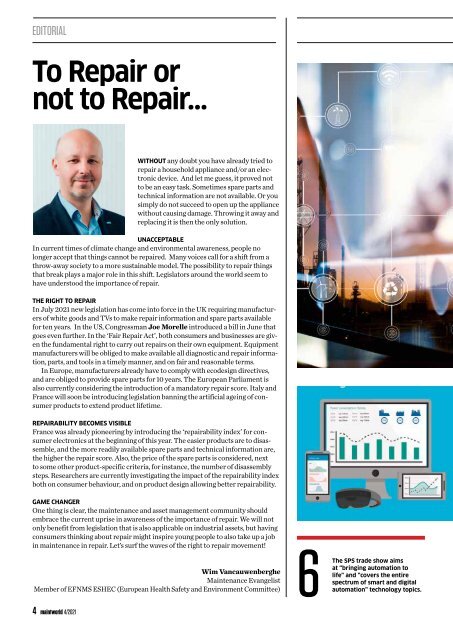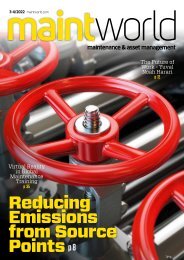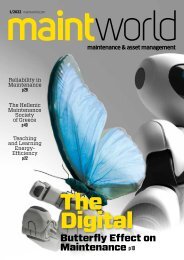Maintworld Magazine 4/2021
- maintenance & asset management
- maintenance & asset management
- No tags were found...
You also want an ePaper? Increase the reach of your titles
YUMPU automatically turns print PDFs into web optimized ePapers that Google loves.
EDITORIAL<br />
To Repair or<br />
not to Repair...<br />
WITHOUT any doubt you have already tried to<br />
repair a household appliance and/or an electronic<br />
device. And let me guess, it proved not<br />
to be an easy task. Sometimes spare parts and<br />
technical information are not available. Or you<br />
simply do not succeed to open up the appliance<br />
without causing damage. Throwing it away and<br />
replacing it is then the only solution.<br />
UNACCEPTABLE<br />
In current times of climate change and environmental awareness, people no<br />
longer accept that things cannot be repaired. Many voices call for a shift from a<br />
throw-away society to a more sustainable model. The possibility to repair things<br />
that break plays a major role in this shift. Legislators around the world seem to<br />
have understood the importance of repair.<br />
THE RIGHT TO REPAIR<br />
In July <strong>2021</strong> new legislation has come into force in the UK requiring manufacturers<br />
of white goods and TVs to make repair information and spare parts available<br />
for ten years. In the US, Congressman Joe Morelle introduced a bill in June that<br />
goes even further. In the ‘Fair Repair Act’, both consumers and businesses are given<br />
the fundamental right to carry out repairs on their own equipment. Equipment<br />
manufacturers will be obliged to make available all diagnostic and repair information,<br />
parts, and tools in a timely manner, and on fair and reasonable terms.<br />
In Europe, manufacturers already have to comply with ecodesign directives,<br />
and are obliged to provide spare parts for 10 years. The European Parliament is<br />
also currently considering the introduction of a mandatory repair score. Italy and<br />
France will soon be introducing legislation banning the artificial ageing of consumer<br />
products to extend product lifetime.<br />
REPAIRABILITY BECOMES VISIBLE<br />
France was already pioneering by introducing the ‘repairability index’ for consumer<br />
electronics at the beginning of this year. The easier products are to disassemble,<br />
and the more readily available spare parts and technical information are,<br />
the higher the repair score. Also, the price of the spare parts is considered, next<br />
to some other product-specific criteria, for instance, the number of disassembly<br />
steps. Researchers are currently investigating the impact of the repairability index<br />
both on consumer behaviour, and on product design allowing better repairability.<br />
GAME CHANGER<br />
One thing is clear, the maintenance and asset management community should<br />
embrace the current uprise in awareness of the importance of repair. We will not<br />
only benefit from legislation that is also applicable on industrial assets, but having<br />
consumers thinking about repair might inspire young people to also take up a job<br />
in maintenance in repair. Let’s surf the waves of the right to repair movement!<br />
Wim Vancauwenberghe<br />
Maintenance Evangelist<br />
Member of EFNMS ESHEC (European Health Safety and Environment Committee)<br />
4 maintworld 4/<strong>2021</strong><br />
6<br />
The<br />
SPS trade show aims<br />
at “bringing automation to<br />
life” and “covers the entire<br />
spectrum of smart and digital<br />
automation” technology topics.

















